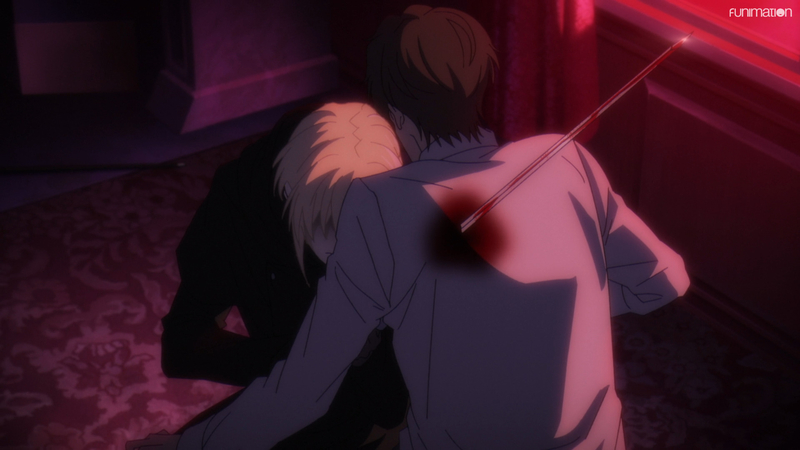
“Welcome to the final problem.”
What They Say:
“The Final Problem Act 1”
When William James Moriarty claims responsibility for being the Lord of Crime in all the papers, aristocratic condemnation and public anger falls upon the Moriartys. The final problem of the Moriarty Plan that William has concocted at long last begins.
The Review:
Content: (please note that content portions of a review may contain spoilers)
It could hardly be a Sherlock Holmes story, much less one specifically focused on James Moriarty, if the conclusion wasn’t titled “The Final Problem.” Whether it bears any resemblance to the original version, it’s the most iconic name to close out a conflict between the greatest consulting detective and his nemesis, the greatest consulting criminal.
Of course, things are very different for this version of Sherlock and Moriarty. We begin the episode, the first part of this two-part finale (for now anyway; the manga is still ongoing, after all) with the news that Sherlock’s first murder accidentally ended up being the perfect crime that Moriarty is always going on about, while the Lord of Crime himself reveals his identity and plan to the world, seemingly contradicting all of his efforts. The role reversal between the classic protagonist and antagonist would appear to be even more profound than it had originally appeared.
Although we start to learn more about William’s master plan, including his own death as a bit of martyrdom to drive home his purpose and to atone for his sins, there are still a lot of questions to ask. Revealing himself to the media when he did didn’t seem that beneficial, and with the message simply being “I’m going to murder all rich people,” it doesn’t seem like there would be much motivation to make the changes he’s looking for. At this point, he’s only making everyone hate him (including commoners, thanks to his performance of killing someone as pure as Whiteley), and even though he plans to die at the end, it’s hard to imagine how that sequence of events will convince the country that its social structure needs reforming. It would come across as nothing more than giving in to terrorism, specifically from a dead terrorist after the fact.
The specifics of how William has been able to waltz around murdering every prominent aristocrat by hand after stating that he would do so and not encountering any police presence is also not covered in much detail, only that the rest of his team works to subdue their security for him. Perhaps if these major plot points weren’t being crammed into these final few episodes, it would play out a bit more smoothly.
The through line of the episode isn’t concerned with logistics as much as emotional resonance, though. William charges in as a villain of almost mythical status, covering himself with the vibrant red blood of the victims he mercilessly slaughters. But through all of it, he is pained by his own actions, and welcomes the opportunity to pay with his own life. Although we can’t fully understand it yet, he’s certain enough of his path leading to a better Britain that he’s willing to sacrifice everything. One encounter includes a particularly irredeemable nobleman using his own children as human shields, counting on this heinous criminal’s humanity exceeding his own. William acts as expected, but more importantly acknowledges the trauma he’s inducing in these children, and that it is only because of his own selfishness that he won’t allow them their rightful vengeance.
William is suffering through his self-righteous murder spree, but the rest of his team has a somber tone of their own, not because of his acts or the precarious position he’s placed all of them in, but because of his intention to die as a coda to this grand performance. Despite claims that all three brothers are equally the Lord of Crime, everyone defers to William as the sole leader whose word is absolute, refusing to defy him while actively appalled by the idea of him dying to fulfill his role. When they turn to the only one who may be able to stop him, the one who apparently needs to unravel his true plans and catch him despite his actions appearing to make himself rather vulnerable, he declares that saving his madman was always the intention. It’s not because it would be contrary to his original plans, but because they’re friends. Yes, it’s quite the twist on the classic dynamic, especially as we’re left off with William declaring them nemeses.
In Summary:
“The Final Problem” has taken many different forms throughout the years, and this one doesn’t have much in common with the classic Sherlock Holmes. Instead, it examines this version of Moriarty through a “sympathy for the devil” sort of lens, taking care in emotional storytelling while the logic of its plot remains somewhat confusing. With one episode left, it has a lot to account for while promising closure with the manga still running, but it’s certainly a highly compelling look at the relationship between these two icons of fiction.
Grade: B+
Streamed By: Funimation



